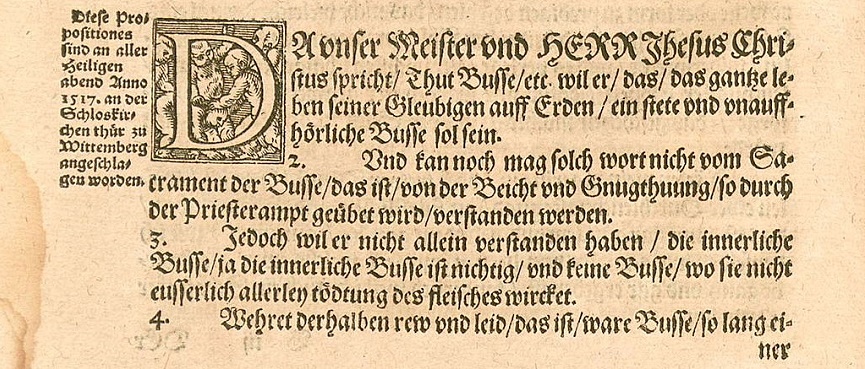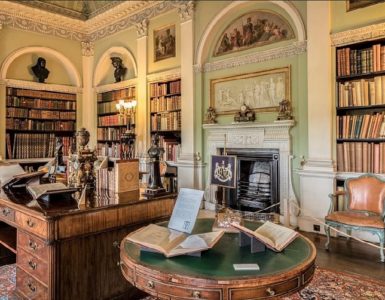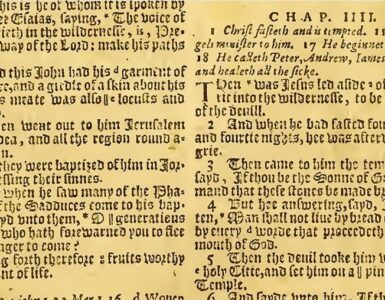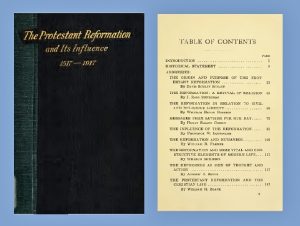 In April 1917 the United States, after a prolonged attempt by the Wilson administration to maintain neutrality, declared war on Germany. The next month the general assemblies of the two largest American Presbyterian denominations convened for their annual proceedings. October 31, 1917 would be the four-hundredth anniversary (quadricentennial) of the posting of Luther’s theses. So, on the one hand, the Presbyterian Church in the United States of America (PCUSA) and the Presbyterian Church in the United States (PCUS) were faced with a major mobilization of the nation for war which included the need for chaplains, but on the other hand, the Presbyterians could not neglect the quadricentennial of the Reformation. There is a touch of irony to all this because as American Protestants remembered an ethnically German Augustinian monk turned reforming hero named Martin Luther, the United States was moving into high gear for mobilization to fight his ethnic descendants in Europe in The Great War and among some Americans there was concern about the loyalty of fellow citizens of German descent.
In April 1917 the United States, after a prolonged attempt by the Wilson administration to maintain neutrality, declared war on Germany. The next month the general assemblies of the two largest American Presbyterian denominations convened for their annual proceedings. October 31, 1917 would be the four-hundredth anniversary (quadricentennial) of the posting of Luther’s theses. So, on the one hand, the Presbyterian Church in the United States of America (PCUSA) and the Presbyterian Church in the United States (PCUS) were faced with a major mobilization of the nation for war which included the need for chaplains, but on the other hand, the Presbyterians could not neglect the quadricentennial of the Reformation. There is a touch of irony to all this because as American Protestants remembered an ethnically German Augustinian monk turned reforming hero named Martin Luther, the United States was moving into high gear for mobilization to fight his ethnic descendants in Europe in The Great War and among some Americans there was concern about the loyalty of fellow citizens of German descent.
The PCUSA convened in Central Presbyterian Church, Dallas, Texas, Thursday, May 17, 1917. The retiring moderator was Rev. John A. Marquis, D.D., LL.D., who delivered his sermon from Ephesians 6:13, “Wherefore take unto you the whole armor of God, that ye may be able to withstand in the evil day, and having done all, to stand.” The military-metaphor verse was suited for a double entendre given the polemics and reforms wrought by Luther’s theses and the tragic conflict raging in many areas of the world, but it is not known whether Moderator Marquis made this connection.
Following the enrollment of commissioners and other preliminaries, Rev. J. Wilbur Chapman, D.D., of the Presbytery of New York was elected moderator by a unanimous vote. The meeting was a busy one and several pages of the minutes addressed subjects related to the recent entry of the United States into The Great War. As the proceedings moved along the report of the five-man committee appointed in 1916 to plan the 400th anniversary of Luther’s posting of The Ninety-Five Theses was presented and a lecture was delivered by Dr. David Schley Schaff (Philip’s son) titled, “The Origin and Purpose of the Reformation.” Recommended and adopted were several actions including encouraging churches to remember the event, the publication of some books including a low-cost biography of Luther, the printing of an illustrated program for special commemorative services, sets of slides illustrating the Reformation for loan to churches, a special offering collection in the churches to be used for education, and a script for a five-episode 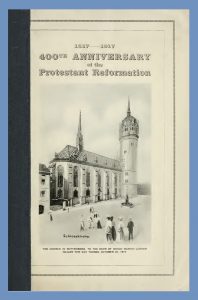 Reformation pageant. The assembly divided itself to gather with family and locals in four churches where each group heard lectures about the Reformation on Sunday night, May 20. Each location had two speakers from a group that included J. Ross Stevenson, William H. Roberts, William R. Farmer, William McKibbin, Frederick W. Loetscher, Henry Sloane Coffin, Andrew C. Zenos, and William H. Black. Some of these men would come to the fore during the controversies within American Christianity in the next decade. The lectures, including the one delivered earlier in the assembly by David Schaff, were published in The Protestant Reformation and Its Influence, 1517-1917, Philadelphia, 1917. Also published was a sixteen-page illustrated booklet titled, 1517-1917, 400th Anniversary of the Protestant Reformation, which included a brief history, some hymns, and other information. These publications are currently available on Internet Archive.
Reformation pageant. The assembly divided itself to gather with family and locals in four churches where each group heard lectures about the Reformation on Sunday night, May 20. Each location had two speakers from a group that included J. Ross Stevenson, William H. Roberts, William R. Farmer, William McKibbin, Frederick W. Loetscher, Henry Sloane Coffin, Andrew C. Zenos, and William H. Black. Some of these men would come to the fore during the controversies within American Christianity in the next decade. The lectures, including the one delivered earlier in the assembly by David Schaff, were published in The Protestant Reformation and Its Influence, 1517-1917, Philadelphia, 1917. Also published was a sixteen-page illustrated booklet titled, 1517-1917, 400th Anniversary of the Protestant Reformation, which included a brief history, some hymns, and other information. These publications are currently available on Internet Archive.
The PCUS convened Thursday, May 17, 1917 in the South Highlands Presbyterian Church in Birmingham, Alabama. The retiring moderator, Rev. C. W. Grafton, D.D., who at the time had been the pastor of the Union Church Presbyterian Church in Mississippi for over 40 years, delivered his sermon from Hebrews 12:2, “Looking unto Jesus, the author and finisher of our faith; who for the joy that was set before him, endured the cross, despising the shame, and is set down at the right hand of the throne of God.” The moderator elected was Rev. John Miller Wells, D.D., a pastor in Wilmington, North Carolina, who would go on to serve in other pastorates and be the president of Columbia Theological Seminary for a few years. In contrast with the proceedings at the PCUSA meetings and its abundant interest in the developing United States war effort, the PCUS minutes mention The Great War in a few passing comments and the adoption of a reminder to ministers regarding the need for chaplains in the military. Also, the assembly sent a brief letter of encouragement to President Woodrow Wilson, a son of the PCUS, informing him of the assembly’s prayers for him during his “trial” and its intercessions for both the army and navy. With reference to the four-hundredth anniversary of Luther’s theses, the committee of two appointed by the previous assembly to plan for the celebration presented its report.
The Committee appointed to frame and submit to the churches a program for the proper celebration of the 400th anniversary of the beginning of the Protestant Reformation would respectfully report that they have proposed such a program, including a Catechism on Luther and the Reformation for use in the Sunday Schools; that most of the program is now in the hands of the Committee of Publication, and that the entire program will be issued in ample time for the convenient use by our pastors, churches, and Sunday Schools.
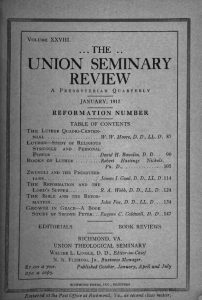 The minutes of the 1918 PCUS General Assembly note that the Committee of Publication in fact printed 7,000 copies of their “program” of which 4,500 were distributed at no cost. However, the “program” is an item of mystery to the author of Presbyterians of the Past. Whether it was a pamphlet, sheet, or brochure is unclear and the online catalogs searched have not yielded an entry nor a digital copy. It was probably not what might be called a bulletin insert because 7,000 copies would not go very far with the nearly 350,000 members of the PCUS at the time. However, the January 1917 issue of The Union Seminary Review (there are two seminaries associated with Presbyterianism named “Union,” this one in Virginia and the other in New York) was dedicated to the anniversary of Luther’s theses. The articles were authored by Moore and Webb of the committee along with others as follows: “The Luther Quadri-Centennial,” by W. W. Moore, “Luther, Study of Religious Struggle and Personal Power,” by David H. Bauslin, “Books on Luther,” by Robert Hastings Nichols, “Zwingli and the Presbyterians,” by James I. Good, “The Reformation and the Lord’s Supper,” by R. A. Webb, and “The Bible and the Reformation,” by John Fox. So, even though the celebration of the quadricentennial of Luther’s hammer and nail event by the PCUS General Assembly was small when compared with that of the PCUSA (1,560,000 members), Union Seminary contributed an issue of its journal with some informative articles. The 1916 General Assembly had also appointed a committee to raise funds for the publication of the works of Ulrich Zwingli and it reported to the 1917 gathering that it was successful and the committee would continue.
The minutes of the 1918 PCUS General Assembly note that the Committee of Publication in fact printed 7,000 copies of their “program” of which 4,500 were distributed at no cost. However, the “program” is an item of mystery to the author of Presbyterians of the Past. Whether it was a pamphlet, sheet, or brochure is unclear and the online catalogs searched have not yielded an entry nor a digital copy. It was probably not what might be called a bulletin insert because 7,000 copies would not go very far with the nearly 350,000 members of the PCUS at the time. However, the January 1917 issue of The Union Seminary Review (there are two seminaries associated with Presbyterianism named “Union,” this one in Virginia and the other in New York) was dedicated to the anniversary of Luther’s theses. The articles were authored by Moore and Webb of the committee along with others as follows: “The Luther Quadri-Centennial,” by W. W. Moore, “Luther, Study of Religious Struggle and Personal Power,” by David H. Bauslin, “Books on Luther,” by Robert Hastings Nichols, “Zwingli and the Presbyterians,” by James I. Good, “The Reformation and the Lord’s Supper,” by R. A. Webb, and “The Bible and the Reformation,” by John Fox. So, even though the celebration of the quadricentennial of Luther’s hammer and nail event by the PCUS General Assembly was small when compared with that of the PCUSA (1,560,000 members), Union Seminary contributed an issue of its journal with some informative articles. The 1916 General Assembly had also appointed a committee to raise funds for the publication of the works of Ulrich Zwingli and it reported to the 1917 gathering that it was successful and the committee would continue.
Moving away from Presbyterian denominational literature some other titles from the Reformation 400th are worth mentioning. From a Lutheran perspective there is the collection of articles titled, Four Hundred Years: Commemorative Essays on the Reformation of Dr. Martin Luther and Its Blessed Results. In the Year of the Four-hundredth Anniversary of the Reformation. By Various Lutheran Writers, edited by W. H. T. Dau and published in St. Louis by Concordia, 1916. Even though it is not specifically titled as a Reformation 400th book, The Episcopate and the Reformation, Our Outlook, by J. P. Whitney, B.D., published in 1917 in both London and Milwaukee might offer some interesting thoughts from a perspective not always considered by Presbyterian and Reformed students. The article by B. B. Warfield titled, “The Ninety-Five Theses in their Theological Significance,” was published in The Princeton Theological Review, October 1917, and a brief piece about his article has been posted on Presbyterians of the Past titled, “Reformation Day 2015, B. B. Warfield on Luther’s Theses.”
Barry Waugh
Sources—The Latin theses document pictured at the beginning of the article is an image from the Berlin State Library-Prussian Cultural Heritage Foundation, http://www.wdl.org/en/item/7497/. The publication covers were taken from Internet Archive and Google Books.


